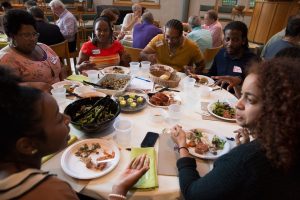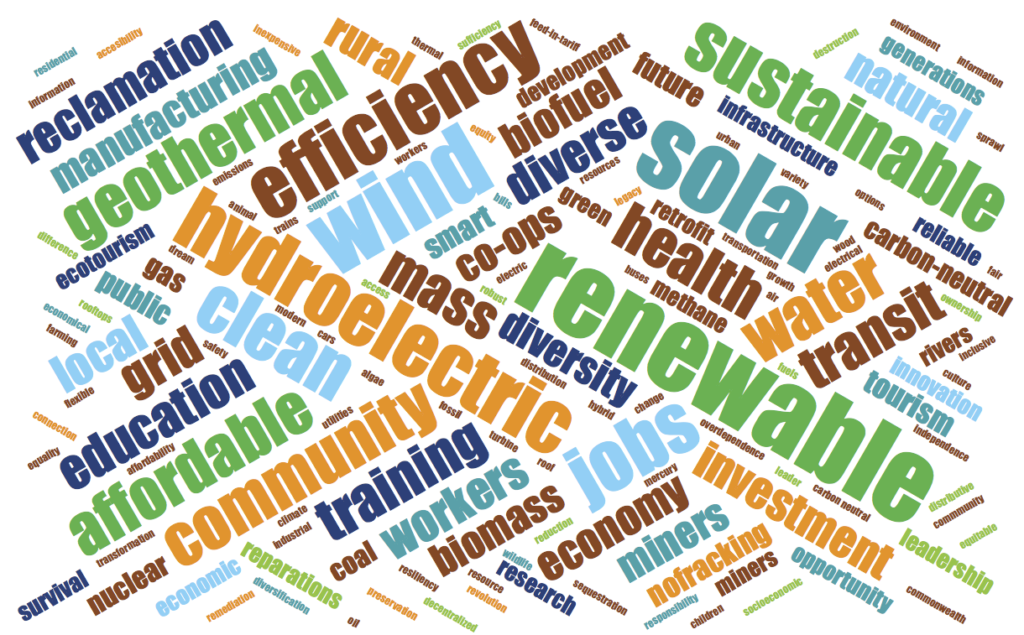In the spring of 2016, 750 people participated in a series of six community conversations – one in each congressional district – about Kentucky’s energy future. These events, called “A Seat At The Table: Community Conversations about Kentucky’s Energy Future,” were free and open to the public, and every seat was reserved in advance. Events were held in:
- Bowling Green (100)
- Hindman (100)
- Lexington (200)
- Covington (100)
- Louisville (200)
- Paducah (50)
By design, A Seat At The Table events were welcoming and inclusive spaces attended by participants from many diverse backgrounds. The three-hour program featured a local foods dinner, a brief informative presentation, and live music and theater performances, followed by in depth table conversations. Volunteers invited many of the guests and facilitated discussions at each table.

Participants included many students and youth leaders, public health professionals, union organizers and members, affordable housing providers, energy and utility workers, low-income residents, workforce development professionals, immigrant rights advocates, renewable energy business owners, faith leaders, farmers, artists, climate activists, parents, grandparents, about a dozen elected officials and candidates, and two utility CEOs. At least one table shared their conversation in Spanish.
We’re ready for transition, but understand the complexity
Volunteers at each table welcomed participants and got the conversation started by asking everyone to share a brief story about their relationship to Kentucky’s energy system.
People spoke about asthma and black lung. They described efforts to become more energy efficient or use renewable energy. They talked about family members who worked in the mines, or their own careers spent running utilities, retrofitting power plants, or working on coal river barges and rail lines. Some described pollution and health problems from living near power plants or strip-mines. Many shared stories about high electric bills, and the struggles faced by renters and people living in old and inefficient homes.
Reflecting on the wide range of deeply personal stories that were shared, one person said, “We’re ready for an energy transition, but understand the complexity.” Another observed, “We need to make a transition. It starts by respecting and understanding affected workers.”![]()
After hearing each other’s stories, the table conversations then focused on three questions:
- What is your vision for Kentucky’s energy future?
- What do you think that will take?
- What are your ideas to ensure that all Kentuckians benefit and no one is left behind as we make the transition to a clean energy economy?
We want better energy options
 This image represents the ideas heard most frequently throughout our public process when Kentuckians were asked about their vision for our energy future.
This image represents the ideas heard most frequently throughout our public process when Kentuckians were asked about their vision for our energy future.
The ideas generated through these conversations were carefully reviewed and have informed key recommendations of the Empower Kentucky Plan. Below is a summary of the most significant and consistent feedback we received:
- Kentuckians are not happy with our energy choices, and want better options.
- An overwhelming majority – 81% – of participants said they want renewable energy and especially solar energy to play a key part in our energy future.
- People want Kentucky to make steady progress towards a future powered by energy efficiency and renewable energy. They know it won’t happen overnight. They want to get started.
- Many participants stressed the importance of investing in a just transition for miners, affected workers, and their communities. They also said that affected workers should play a key role in shaping the transition.
- People want Kentucky’s energy sources to be more diverse. And they want more of our electricity to come from locally and community-owned renewable energy.
- Motivations mentioned most often were concern for climate change, health, affordability and jobs.
- Many people also called for changes far beyond the power sector – including a more sustainable food system and expanded mass transit.
- When asked “What will it take?” to make change for the better, the two most common responses were “education” and “political will.”
Resources about A Seat At The Table
- Presentation about Kentucky’s changing energy landscape given at A Seat At The Table
- A progress report webinar for A Seat At The Table participants
- A summary of public feedback (pdf)